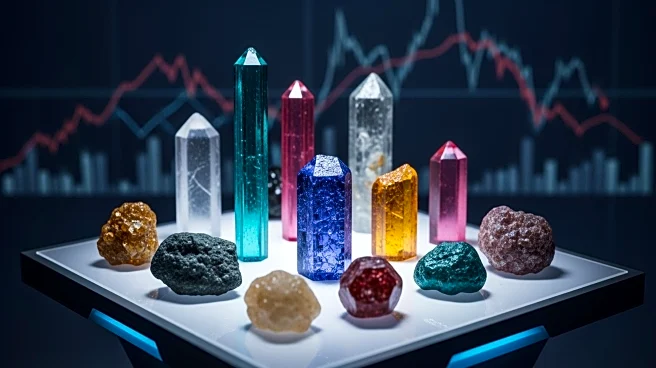What's Happening?
MP Materials CEO James Litinsky has advised investors to approach the rare earths industry with caution, highlighting the challenging economics of the sector. The U.S. rare earth market has seen significant
volatility, driven by speculation around potential deals similar to the Trump administration's agreement with MP Materials. The Defense Department has taken an equity stake in MP, aiming to reduce China's dominance in the industry. Litinsky emphasized the importance of understanding the structural economics of rare earth projects, warning that many promoted projects may not be viable at current prices.
Why It's Important?
The rare earths industry is crucial for various high-tech applications, including defense and electronics, making it a strategic sector for the U.S. economy. MP Materials' cautionary stance highlights the risks associated with investing in this volatile market, where speculative trading can lead to significant financial losses. The industry's dynamics are influenced by geopolitical factors, particularly the U.S.-China trade tensions, as the U.S. seeks to secure its supply chain independence. Investors must carefully evaluate the viability of rare earth projects to avoid potential pitfalls in this rapidly evolving sector.
What's Next?
Investors may reassess their strategies in the rare earths market, focusing on established companies with proven track records and stable production capabilities. The U.S. government is likely to continue supporting domestic rare earth production to counter China's influence, potentially leading to more strategic partnerships and investments. As the industry matures, companies like MP Materials may play a pivotal role in shaping the future of rare earths supply chains, influencing global market trends and technological advancements.
Beyond the Headlines
The rare earths industry's growth raises ethical and environmental concerns, as mining and processing can have significant ecological impacts. The push for domestic production must balance economic interests with sustainable practices to minimize environmental damage. Additionally, the geopolitical implications of rare earths supply chains highlight the need for international cooperation and regulatory frameworks to ensure fair competition and resource management, addressing the broader challenges of resource dependency and global trade dynamics.











